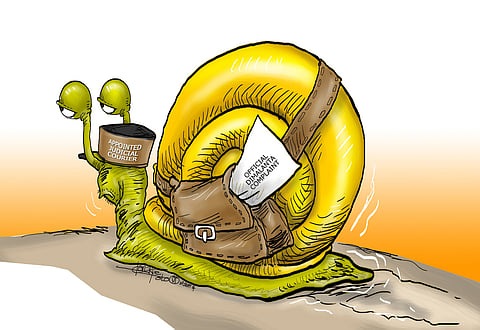
- NEWS
- the EDIT
- COMMENTARY
- BUSINESS
- LIFE
- SHOW
- ACTION
- GLOBAL GOALS
- SNAPS
- DYARYO TIRADA
- MORE

The situation Energy Regulatory Commission (ERC) chairperson Monalisa Dimalanta finds herself in is typical of many Filipinos facing court action but who are deprived of giving a proper response due to antiquated judicial processes that should not be hard to change.
The use of snail mail or the post office alone resulted in Dimalanta, the head of a crucial energy agency, resorting mostly to guesswork in drafting an appeal to the Ombudsman who imposed a six-month preventive suspension on her.
The move of the anti-graft body was based on a petition of the National Association of Electricity Consumers for Reforms Inc. (Nasecore) against Dimalanta for supposedly not acting quickly enough to resolve cases it had filed.
The suspension came a few days after the Supreme Court threw out the motion for reconsideration of the ERC of its decision upholding the Court of Appeals in junking the regulatory body’s decision not to allow San Miguel Corp. power plants to break their power supply agreements (PSA) that barred an increase in contracted prices beyond what was provided in the PSAs.
SMC cited a “change in circumstances” for seeking relief from the fixed-price provision in the contracts which ERC did not allow.
The Asian business giant then went straight to the CA, which allowed SMC to terminate the PSAs.
“I hope the reason the complaint has not reached me yet is it was sent through registered mail,” Dimalanta said.
Dimalanta, who is in the second of a seven-year tenure at the ERC, said the six-month suspension is financially painful for a public servant who had divested from all of her business interests to go into public service.
“I have received a copy of Executive Secretary Lucas Bersamin’s directive to serve the suspension” but up to now, Dimalanta said, she has not received a copy of the complaint that was the basis for her suspension.
“I am still guessing what the complaint is about so I can write a reply. I saw portions of the petition against me in the Ombudsman order but it remains unclear what the issues are that I should answer,” she said.
“For now, my counsels are reviewing what we have and how we can reply since we want to immediately file a motion for reconsideration,” she added.
The besieged official began serving her suspension last Tuesday but reiterated that she would contest the Ombudsman’s order.
“I am confident that I can fully explain and hopefully the Ombudsman will understand and lift the suspension so that I can return to work,” Dimalanta said.
Yet, at this time of instant data exchanges, Dimalanta rued that she has not received a copy of the complaint against her.
“It is hard to reply to something that you do not have full knowledge of, so my lawyers are having a hard time and we’re being careful since we are at this time guessing the basis for the preventive suspension order,” she said.
Still, she said, “We are drafting, the best we can, a set of arguments based on what we understand was the basis for the complaint.”
A judiciary caught in the age of antiquity is easy to exploit to deny the quick dispensation of justice such as Dimalanta is going through.
The Supreme Court and the Department of Justice must work together to find a solution to the common problem of those slapped with a court charge, who at times lose by default since they had not received a copy of the complaint against them through registered mail that may have gone astray.
It would not take much effort for a court to send an email to the parties in a dispute or have the complaint posted on the internet that the recipients could verify and respond to.
Technology is here to help dispense justice, so why not use it?
